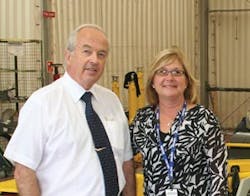Editor's Note
Exactly one year ago, legislation was passed for a 100-percent air passenger cargo screening mandate by August 2010. Included in the legislation is a midpoint milestone requiring 50 percent screening of all air cargo moved on passenger aircraft no later than February 2009. Some members of the industry have expressed concerns regarding the cost of Transportation Security Administration (TSA) compliance and that it could break the bank with estimated outlays of $150,000 to $500,000 or more per facility. In addition, the TSA’s policy of providing capital funding for the Certified Cargo Screening Program (CCSP) pilot participants leaves other non-pilot smaller firms at a financial disadvantage.
On the flip side, public/private funding for security initiatives is inevitable and though it’s understandable shippers would not want to bear too much of the expense burden, these security regulations are long overdue.
TSA’s Ed Kelly and Joe Sammon have been working closely with the National Air Transportation Association’s Airline Services Council (NATA ASC) to determine how to assist freight forwarders and service companies in making a smooth transition to meet the mandates. “Usually, what you see is government agencies will dictate something and then the company has to scramble to figure out how it’s going to comply,” Jack Evans, Total Airport Services and ASC co-chairman says. “It really is encouraging to see how Ed and Joe have handled this; coming to [the ASC], listening to our knowledge and expertise and utilizing it by taking it back to [Capitol Hill].”
It remains to be seen exactly how it will all play out as far as the “chain of custody” is concerned. According to Evans, very few large companies that can take on all cargo screening for an airport and while there are a lot of freight forwarders and “mom and pop” operations, it would be cost prohibitive.
The TSA is considering the design and implementation of a program where certified service companies can represent several airlines and in so doing, provide fair and equitable handling of the porter’s cargo while meeting all of the TSA requirements.
Evans and his competitors are looking at this as an opportunity to meet the requirements while increasing business.
At the July NATA Airline Services Council business meeting, Kelly encouraged members who provide cargo handling screening services to contact their local TSA cargo principal security inspectors (PSI) to initiate their company’s involvement in the freight forwarder pilot program. According to Eric Byer, vice president of government and industry affairs for NATA, a list of approved cargo screening equipment will be available in the near future.
For more information on this and other issues covered by the NATA Airline Services Council, or to become a member, please visit their Web site at http://www.nata.aero/asc/index.jsp.
